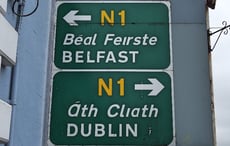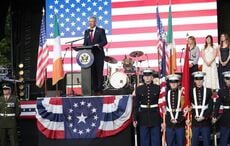NORTHERN Ireland First Minister Ian Paisley and Deputy First Minister Martin McGuinness have denied that they were forced to appoint four victims' commissioners because they could not agree on a single candidate.There was surprise last weekend when it emerged that Paisley and McGuinness intended to appoint four people to work as the North's victims' commissioners in place of the previous sole position.Political opponents had accused Paisley and McGuinness of "chickening out" by picking multiple commissioners who will be acceptable to all sides.The four commissioners include Bertha McDougall, whose policeman husband Lindsay was murdered by the INLA in 1981.Patricia McBride's father Frank died after he was shot by Loyalists at his home in east Belfast in 1972. In 1984 McBride's brother Anton was shot dead by the SAS during an ambush on the IRA in Co. Fermanagh.Brendan McAllister has previously acted as a mediator between Nationalist residents and the Orange Order over the Drumcree dispute. The fourth appointee was local TV newsreader Mike Nesbitt.Paisley and Mc-Guinness rejected claims that they had been unable to agree on a single candidate."Nothing could be further from the truth," McGuinness said. "We never at any stage of our deliberation had a situation where the first minister proposed someone and I proposed someone as an alternative. It never happened."I know some people may greet this with incredulity, but I think it's a symbol of how he and I do the business in terms of moving forward."Paisley also defended the multiple appointments."Our belief is that a team of four commissioners working together, in essence a victims' commission, is the best way forward," he said."Given the significant backlog of urgent work and the range of difficult challenges that face us in this area, these four people will have much more capacity to engage with victims and survivors than a single commissioner."Following their appointments on Monday, the commissioners said it was now time to concentrate on victims' issues rather the process which selected them."We hope we can all now move forward and switch the focus away from the appointment process and return where it belongs, on the victims and survivors, the people who have paid, and continue to pay, the greatest price," said McAllister.The appointments received a mixed reaction, but were broadly welcomed among Nationalist and Unionist victims' groups.Willie Frazer, who works with the victims of Republican violence, said, "We would be very much up for the idea of having a commission. This is something which we have been calling for."But we have concerns about the make up of the commission. Does the definition of victim mean the perpetrator as much as the child blown up in the car, or the man and woman coming out of church?"That we would have to challenge. If that is the cost of it, we'd rather do without it."Mark Thompson, whose Relatives for Justice group works with the victims of state and Loyalist violence, welcomed the appointments."It is a clear attempt aimed at addressing all of the existing concerns by all of the varying constituencies or people bereaved or injured, which is always going to be difficult," he said."The composition of the commission is therefore broadly inclusive and will contribute to building trust."




Comments